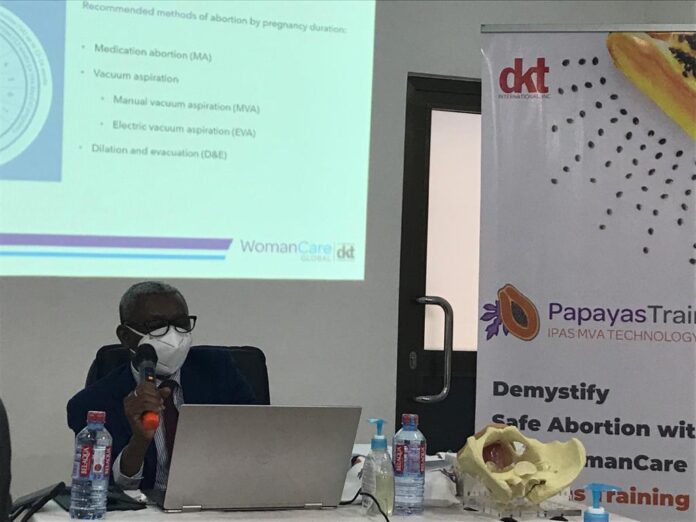
Obstetrician and Gynaecologist at the Korle Bu Teaching Hospital Dr. Ali Samba says Ghanaians have a hypocritical posture towards abortion.
According to Dr Samba, who doubles as the Director of Medical Affairs at the same facility, the hypocrisy around abortion is huge as some people act as though they are “holier than thou”.
Speaking at Papayas Training, an initiative to demystify safe abortion in Ghana, he said there is so much hypocrisy when it comes to issues relating to abortion.
He noted, “Some people act holier than thou and sit to accuse people as sinners for seeking for abortion. Everyone does it, from the most religious people to everyone. They do it for varied reasons. There is no typical abortion care seeker”.
Dr Sambah also encouraged people to opt for safe abortion care to reduce health complications when the needs arrive rather than engaging with quack doctors for unsafe abortions.
As part of the International Safe Abortion Day, DKT International Ghana, a global non-profit social enterprise in collaboration with DKT WomanCare, on Monday, September 27, 2021, coordinated a campaign to create awareness on safe abortion ahead of the commemoration of this year’s International Safe Abortion Day.
The roundtable discussion in Accra explored the use of Manual Vacuum Aspirators (MVA) in Ghana to deter Abortion care seekers from indulging in an unsafe abortion from unqualified doctors.
Unsafe abortion is defined by WHO as a procedure for terminating unwanted pregnancy either by persons lacking the necessary skills or in an environment lacking minimal medical standards or both whiles Safe abortion is an abortion provided by a trained person with a WHO qualified method (Medical abortion, Vacuum aspiration, Dilatation and evacuation)
Unsafe abortions when performed under the least safe conditions can lead to complications such as incomplete abortion (failure to remove or expel all of the pregnancy tissue from the uterus), haemorrhage (heavy bleeding), infection, uterine perforation (caused when the uterus is pierced by a sharp object), damage to the genital tract and internal organs by inserting dangerous objects such as sticks, knitting needles, or broken glass into the vagina or anus.
Abortion which is the loss of pregnancy before the fetus is capable of extra-uterine life can either be Spontaneous or Induced.
Over half of all estimated unsafe abortions globally were in Asia, most of them in the south and central Asia, 3 out of 4 abortions that occurred in Africa and Latin America were unsafe. The risk of dying from an unsafe abortion was the highest in Africa
Each year between 4.7% – 13.2% of maternal deaths can be attributed to unsafe abortion. In developed regions, it is estimated that 30 women die for every 100 000 unsafe abortions. The number rises to 220 deaths per 100 000 unsafe abortions in developing regions and 520 deaths per 100 000 unsafe abortions in sub-Saharan Africa
In Africa, nearly half of all abortions happen in the least safe circumstances. Moreover, mortality from unsafe abortion disproportionately affects women in Africa
In Ghana, 311 women died in 2019 from complications of abortion which accounts for 9.2% of direct maternal deaths (GHS, FHD Annual Report 2019).
According to the Ghana Statistical Service, almost 1 in 6 (15%) of women in reproductive age in Ghana have had an unsafe abortion (GSS, 2016) with almost 1/3 of women in rural areas who procure abortion use illegal and non-medical methods (GMHS, 2017).
Women age 15-49 who had an induced abortion in the 5 years preceding the survey had varied reasons for the most recent induced abortion. Just over one-fifth of women cited being not ready, too young, or wanting to delay childbearing (21%), 15% cited not having money to care for a baby, 12% cited wanting to space their births, 10% cited wanting to continue going to school or other life circumstances (including nobody to help look after a baby, wanting to continue working, or wanting no more children). Smaller percentages (4%-9%) cited other reasons.
Other reasons why women have induced abortion also include; Pregnancy outside wedlock/marriage is frowned upon by society, Did not love PARTNER/did not want to stay with the PARTNER, Sexual coercion, rape, sexual abuse, Medical problems, Fetal malformation, Family planning services not accessible or affordable, Father did not want a child/denied the pregnancy, Contraceptive failure, Poor contraceptive counseling.
Short-term complications of unsafe abortion are; incomplete abortion, Infection, Haemorrhage, Shock, Injury to the genital tract and internal organs, Psychological trauma, Social disapproval. Long term complications of unsafe abortion: Chronic pelvic pain, PID, Infertility, Psychological trauma, Social ostracism
Unsafe abortion can be prevented through comprehensive sexuality education which are; prevention of unintended pregnancy through the use of effective contraception, including emergency contraception, education for women and HCP’s, availability of services and provision of safe, legal abortion.#SafeAbortion4All
About DKT International
DKT International is a registered, non-profit organisation founded in 1989 to focus the power of social marketing on some of the largest countries with the greatest needs for family planning, HIV/AIDS prevention, and safe abortion.
It is one of the largest private providers of family planning products in the world, having generated over 48.6 million couple years of protection (CYPs) in 2020.
Five of the ten largest contraceptive social marketing programs in the world are DKT programs.
Since 2012, DKT has operated to provide safe, affordable, and effective choices of contraceptive and HIV prevention products and services through pharmacies, chemical shops, private clinics, and maternity homes.
As the market leader, DKT distributes a variety of products ranging from Fiesta Condoms and Kiss Condoms as well as the proprietary owner of Lydia (a female reproductive health brand with a complete range of contraceptives options).
Source: Ghana/Starrfm.com.gh/103.5fm

